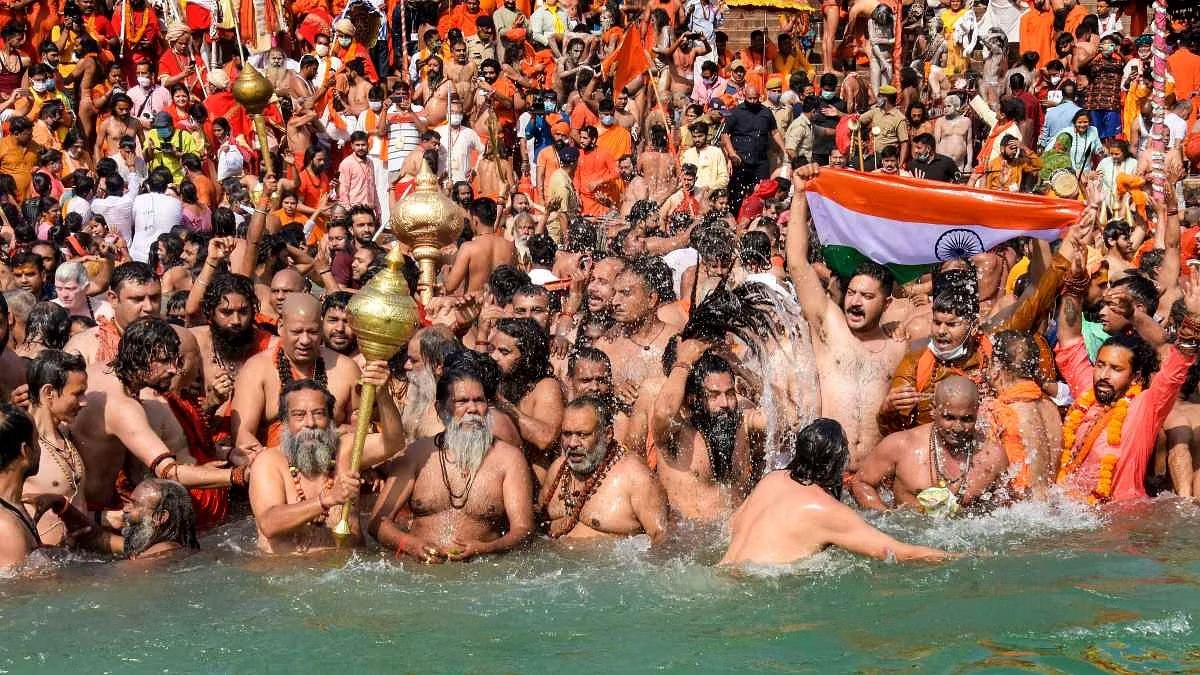Famous Akharas in Kumbh Mela 2025: The Maha Kumbh 2025 is a momentous religious and cultural event that draws millions of devotees from all over the world to the sacred confluence of the Ganges, Yamuna, and Saraswati rivers. It is considered one of the largest gatherings of people for a spiritual purpose, symbolizing unity, faith, and purity. The Kumbh Mela is a celebration of spiritual awakening and marks an important occasion for Hinduism, with many sacred rituals, prayers, and ceremonies being performed.
Among the most significant elements of the Maha Kumbh are the Akharas—spiritual organizations or sects made up of ascetics and sadhus (holy men). These Akharas follow distinct spiritual traditions and practices, and their participation in the Maha Kumbh highlights the diversity and unity of the Hindu faith. In this article, we explore the major Akharas that participate in the Maha Kumbh, categorized by their spiritual affiliations: Shaiva, Vaishnav, Nirmohi, and Sikh traditions.
Table of Contents
Major Akharas in the Maha Kumbh 2025
There are 13 major Akharas that participate in the Maha Kumbh, each following specific religious philosophies and spiritual practices. These Akharas are divided into the following categories:
Shaiva Akharas in Kumbh Mela: Followers of Lord Shiva

Shaiva Akharas are those dedicated to the worship and devotion of Lord Shiva, the Supreme God in Hinduism. These Akharas are known for their intense meditation, ascetic practices, and spiritual discipline. The followers of Shaiva traditions consider themselves deeply connected to the divine energies that flow from Lord Shiva.
Nirvani Akhara
This Akhara is one of the most prominent Shaiva Akharas, known for its deep connection to Lord Shiva and its role in the spiritual education of its devotees. Nirvani Akhara adheres to strict asceticism and meditation as a means of attaining liberation.
Agni Akhara
Known for its association with fire rituals and the worship of Agni (the fire god), the Agni Akhara practices intense spiritual discipline, with an emphasis on the power of fire as a medium to invoke divine blessings.
Mahakal Akhara
Associated with the famous Mahakaleshwar Temple in Ujjain, this Akhara represents the devotion to Lord Shiva in his most powerful form. The Mahakal Akhara follows the Shaiva tradition with a special focus on the worship of Lord Mahakal.
Shankar Akhara
This Akhara honors Lord Shankar (another name for Shiva) and follows his teachings of meditation and renunciation. It is one of the oldest Shaiva Akharas and is known for its focus on profound spiritual practices.
Naga Akhara
Naga Akharas are renowned for their ascetic practices, where the sadhus (holy men) often engage in intense meditation and worship in a state of complete renunciation, including the act of remaining naked to symbolize their detachment from the material world.
Read our article here to know about the next shahi snan of Maha Kumbh Mela 2025
Vaishnav Akharas in Kumbh Mela: Followers of Lord Vishnu and His Avatars

Vaishnav Akharas are spiritual communities that follow Lord Vishnu, who is considered the preserver of the universe in Hinduism. The devotees of Vaishnavism believe in the ultimate power of Vishnu’s avatars, particularly Rama and Krishna.
Ram Akhara
Dedicated to Lord Rama, an incarnation of Vishnu, this Akhara focuses on upholding the values of righteousness (Dharma) and the importance of living a life guided by truth and honor.
Swaminarayan Akhara
This Akhara follows the teachings of Swaminarayan, a prominent spiritual leader who emphasized the worship of Lord Vishnu. The Swaminarayan Akhara is known for its devotion to community service and spiritual enlightenment.
Poonamiya Akhara
Focused on the worship of Lord Vishnu, the Poonamiya Akhara participates in the Maha Kumbh with the goal of spreading divine wisdom and achieving spiritual liberation. It is known for its simplicity and commitment to devotion.
Nirmohi Akharas in Kumbh Mela: Devotees of Unconditional Faith

Nirmohi Akharas are devoted to selfless service and absolute devotion to the Supreme Divine. The Nirmohi tradition focuses on renunciation, meditation, and surrender to the will of the divine, without expecting any material benefits.
Arthi Akhara
This Akhara is part of the Nirmohi tradition and follows the principle of detachment and devotion to the Lord. The sadhus of Arthi Akhara focus on serving others and achieving spiritual enlightenment.
Siddha Akhara
The Siddha Akhara consists of sadhus who practice yoga, tantra, and meditation as their path to attaining self-realization and connection with the Divine. They aim for spiritual liberation through deep meditation and discipline.
Gyaan Ganga Akhara
Known for its emphasis on the pursuit of knowledge and wisdom, the Gyaan Ganga Akhara is a place of intellectual and spiritual learning. The followers of this Akhara believe in achieving divine connection through the study of scriptures and spiritual texts.
Sikh Akharas: Devotees of Guru Nanak’s Teachings
Sikh Akharas are religious organizations following the teachings of Guru Nanak and other Sikh Gurus. Sikhism is a monotheistic faith that emphasizes devotion to one God, equality, and service to humanity. Sikh Akharas focus on seva (selfless service) and bhakti (devotion).
Shiromani Akhara
This is the leading Sikh Akhara and is dedicated to the teachings of Guru Nanak. It is responsible for spreading Sikhism’s core values of equality, compassion, and devotion to the one true God.







